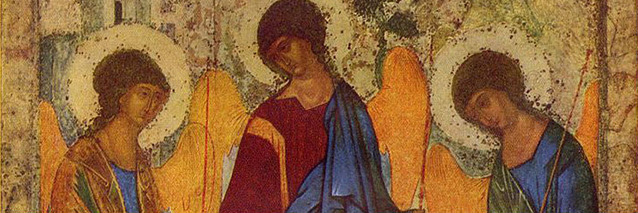Richard Rohr's Meditation: "The Patristic Period"
"The Cappadocian Fathers developed an intellectual rationale for Christianity's central goal: humanity's healing and loving union with God."
Richard Rohr's Daily Meditation

"Trinity" (detail), c. 1410, Andrei Rublev. Tretyakov Gallery, Moscow.
"Fathers of the Eastern Church""The Patristic Period"
Sunday, 10 May 2015
As I shared last week, the desert fathers and mothers focused more on the how than the what. Their spirituality was very practical: virtue and prayer-based. This week we'll look at a parallel tradition, the Patristic Period, that emphasized the what--the rational, philosophical, and theological foundations for the young Christian religion. This period stretches from around AD 100 (the end of the Apostolic Age) to either AD 451 (with the Council of Chalcedon) or as late as the 8th century (Second Council of Nicaea).
The word patristic comes from the Latin and Greek pater,father. The fathers of the early church were primarily "Eastern" in that they lived in the Middle East and Asia, which are East relative to Europe. We must admit that because women were often not allowed education--much less influence--in this patriarchal period of history and religion, it is mostly men that we are referring to here. (I am sorry to say, today's Church and culture are still not congruent with either Jesus' or Paul's attitudes toward women, which were both far ahead of their cultural stage and training.)
Alexandria in Egypt was a primary center for learning and culture across many fields--philosophy, art, medicine, literature, and science--during the Hellenistic and Roman periods (310 BC - AD 330). The library in Alexandria was probably the largest in the ancient world. Greek, Eastern, Jewish, and Christian thought intersected in this environment, bringing together diverse perspectives and many saints and scholars.
One of the key teachers of the Alexandrian school, Origen (AD 184-254), is considered to be the first Christian theologian. Many of his ideas, particularly apocatastasis("universal restoration"), were largely misunderstood and thus declared heretical in the 6th century. The Alexandrian interactive/dynamic/mystical understanding of Jesus' human and divine natures (developed by Athanasius, Cyril, and Bishop Dioscorus) became dominant for a while but was later rejected at the Council of Chalcedon (AD 451), which insisted on Jesus having two very distinct natures, which then became hard to reconnect on any practical level--in him and then in us!
Building on the Alexandrian school's work, the Cappadocian Fathers (in what is now Turkey) further advanced early Christian theology with their doctrine on the Trinity. The three theologian saints, Basil the Great (330-379), his younger brother Gregory of Nyssa (c. 332-395), and Gregory of Nazianzus (329-389), sought to give Christianity a solid scholarly status, on par with Greek philosophy of the time. They developed an intellectual rationale for Christianity's central goal: humanity's healing and loving union with God.
We'll explore these early Eastern theologians' views on Christ, Trinity, theosis, universal salvation, and hesychasm(prayer of rest) throughout the remainder of this week.
Gateway to Silence: We are one.
References:
- I highly recommend Amos Smith's study of the Alexandrian mystics,Healing the Divide: Recovering Christianity's Mystic Roots (Resource Publications: Eugene, Oregon, 2013), for which I wrote the Afterword.
- For a simple chronology outlining the key figures and events of the Early Christian Church and Patristic Period, click here.
cac.org
Center for Action and Contemplation
1823 Five Points Road SW (physical)
PO Box 12464 (mailing)
Albuquerque, New Mexico 87195 United States
____________________________
____________________________





No comments:
Post a Comment